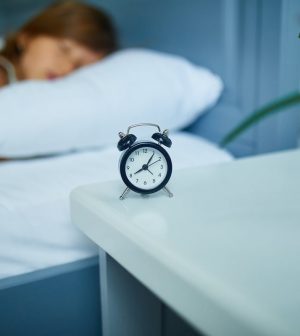- Could Your Grocery Store Meat Be Causing Recurring UTIs?
- Are You Making This Expensive Thermostat Error This Winter?
- Recognizing the Signs of Hypothyroidism
- 10 Strategies to Overcome Insomnia
- Could Artificial Sweeteners Be Aging the Brain Faster?
- Techniques for Soothing Your Nervous System
- Does the Water in Your House Smell Funny? Here’s Why
- Can a Daily Dose of Apple Cider Vinegar Actually Aid Weight Loss?
- 6 Health Beverages That Can Actually Spike Your Blood Sugar
- Treatment Options for Social Anxiety Disorder
Kids’ Bedtimes Might Influence Odds for Drug, Alcohol Use as Teens

Regular bedtimes won’t just help your child be alert for a busy school day; they might also help keep them from abusing drugs or alcohol as a teen, new research suggests.
Youth who’d had early bedtimes in childhood and adolescence were significantly less likely to be drinking or using marijuana by the time they were 15, compared to kids who’d stayed up late and had fewer hours sleep, researchers report.
“If we improve sleep in the school-age population, not only could that show improvements in sleep health but in other aspects like the decision to engage in risky behaviors like alcohol and other substance use,” theorized study senior author Anne-Marie Chang. She’s an associate professor of biobehavioral health at Pennsylvania State University in University Park, Pa.
Over 1,500 children were included in the new study and they resided in 20 cities across the United States. As part of the study, parents recorded what time the kids were sent to bed at ages 3, 5 and 9, as well as how long they typically slept each night as ages 5 and 9.
Drug and alcohol use in the children’s later teenage years was also tracked.
Chang’s group found that a child was 45% more likely to try alcohol by the age of 15 if she or he had had a later bedtime at age.
The age 9 bedtime statistic seemed key: There was no correlation between alcohol use at age 15 and bedtimes at ages 3 or 5, the research showed, nor was there any correlation with the duration of sleep at ages 5 or 9.
Things were a bit different when it came to using marijuana at age 15.
Having a later bedtime at age 5 was linked to a 26% higher odds of using weed later, and sleeping an hour less per night at age 9 was linked to a 19% rise in trying marijuana at age 15.
Having later bedtimes at the age of 15 was also linked to significantly higher odds for using marijuana or alcohol at that age, Chang’s group found.
The findings were published recently in the Annals of Epidemiology.
The study wasn’t designed to prove cause and effect; it could only point to associations.
“Sleep is multifaceted. It’s important for children because it helps with growth and development. The brain is more plastic during younger ages and you want healthy sleep to support neural development,” noted study co-lead author David Reichenberger, a doctoral student at Penn State at the time the study was conducted.
He and Chang believe their finding reinforce the important of parents encouraging healthy sleep habits early in a child’s development.
“Poor sleep health could have downstream effects on their physical health as well as decision-making, which could in turn be related to their decision to engage in substance use,” Reichenberger said.
More information
Find out more about about good child sleep habits at the Sleep Foundation.
SOURCE: Pennsylvania State University, news release, Aug. 13, 2024
Source: HealthDay
Copyright © 2026 HealthDay. All rights reserved.










